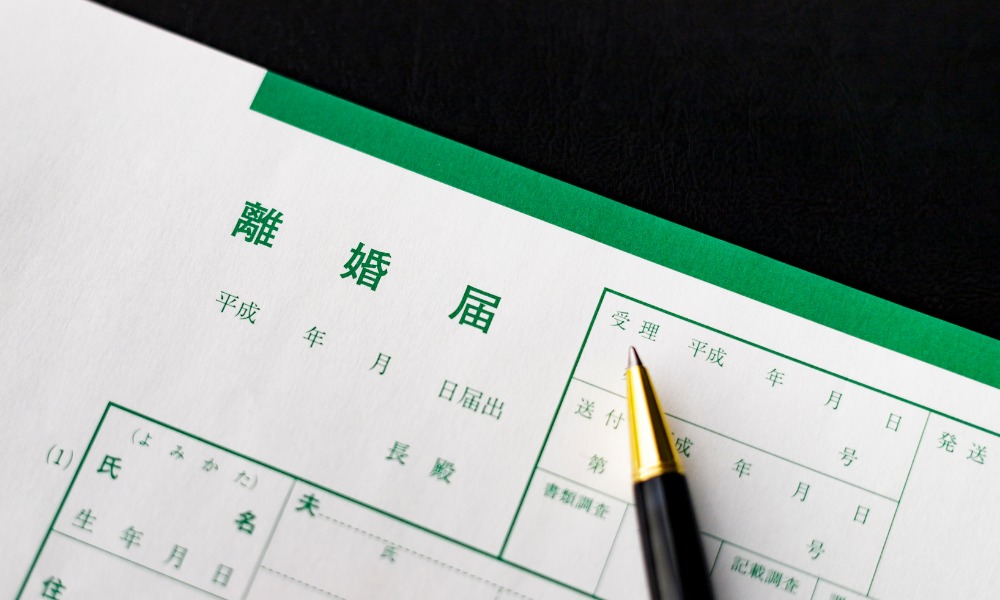Marriages sometimes do not always pan out as predicted, and you might be in need of a general understanding of how divorce works in Japan.
Here is what you need to know about divorce in Japan–straight and simple.
How to Get Divorced in Japan
In principle, in Japan, most divorces are settled through mutual agreement, and there is no need to go through complicated court proceedings.

Image credit: Canva
However, there are four main ways (jp only) to get divorced in Japan.
Divorce by Mutual Agreement
Divorce by mutual agreement (協議離婚, kyogi rikon): the easiest and most hassle-free way to get divorced in Japan is by reaching a mutual agreement between the two parties. In this case, both parties have to file a form called a rikon todoke (離婚届), a notice of divorce that has to be submitted to the local government office. In this case, the husband and wife have agreed not only on the divorce but on related matters such as the division of assets and custody of children.
Divorce by Mediation
The second most common method of divorce in Japan is divorce by mediation in a family court (調停離婚, chotei rikon). When a mutual agreement cannot be reached by the parties, they need the mediation of a judge to reach a compromise on matters such as parental rights, division of properties, and expenses. If conciliation does not succeed, a decision is made by the family court.
Divorce by Decision of the Family Court
Following divorce by mediation is divorce by decision of the family court (審判離婚, shimpan rikon): In this case, both parties agreed to divorce but cannot find common ground on the conditions and so the decision is left to the family court.
Divorce by Litigation
The final method of getting a divorce in Japan, which is quite rare, is divorce by the judgment of a district court or divorce by litigation (裁判離婚, saiban rikon). This is the case when one of the parties does not agree on the divorce in the first place.
There must be a clear legal reason to file for divorce and to go through a saiban rikon. The reasons, as explained in article 770 of the Japanese Civil Code, include infidelity, mental illness, and domestic violence, for example.
Once the case is decided, the court will issue a certified copy and certificate of settlement to be attached to the Divorce Registration.

Image credit: Canva
Divorce Between a Japanese National and a Foreign National
In the case of a divorce between a Japanese national and a foreign national, both living in Japan, if the divorce is filed and happens in Japan, both parties are subjected to Japanese law.
Divorce Between Two Foreigners in Japan
In case of a divorce between two foreign nationals living in Japan, they will have to follow their own home country’s laws and regulations to file for divorce. The best way to proceed is to contact your local consulate or embassy to know what is required and see if they can offer or recommend any legal support.
Visa Status after Divorcing a Japanese National
If you are staying in Japan under a “Spouse of Japanese National or Spouse of Permanent Resident” visa, the divorce will affect your resident status. You will need to notify Immigration of the change of status within 14 days, and you will have to change your visa within six months from the date of the divorce.
What are the Options for Changing Your Visa?
If you are a full-time employee of a company, you can ask your company to sponsor your working visa. If you have been living in Japan for more than ten consecutive years, you can apply for a “permanent resident visa.” Whereas, if you have parental authority over a Japanese child, you can apply for a “long-term resident visa.”
Know Your Options
These are the basic pieces of information you need to consider when deciding to go through a divorce in Japan–or when considering getting married.
They are a good starting point to consider your situation but always consult a professional–they will be able to provide all the necessary information to help you make the transition as smoothly as possible.
Related Articles:
- Planning a Wedding in Japan as a Foreigner
- Japanese Relationships & Marriage: Traditional vs. Modern times
- Family Rental: Can Money Buy the Appearance of Love?
- How to Get a Tokutei Gino Visa for Specified Skilled Workers
- COVID-19: How Japan’s Closed Borders Affected Students, Spouses & Workers






